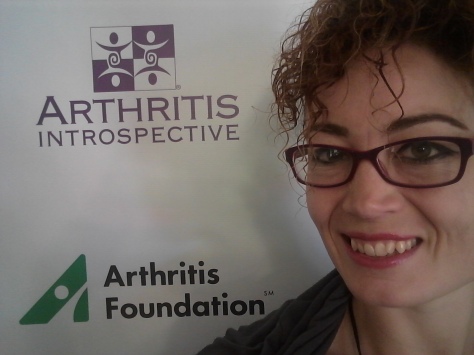There is not a one-size-fits-all way to become a chronic disease advocate or activist. Everyone’s journey will be shaped by personal experiences, interests, time and ability.
I’ve gathered these tips from my own journey, but by no means is this an exhaustive list and I don’t recommend attempting them all at once. Also, while directed at people who have chronic diseases, these tips can apply to partners, caregivers, friends and family who want to become allied advocates.
As long as the end goal is to raise awareness publicly for the sake of social or political change, there is no inherently wrong way to create an advocacy platform.
1) Get comfortable telling your own story. Come out as sick. Introduce your disease to friends, family, and peers in a manner that also outlines your clear desire for them to listen – you may even need to say, “This is my story and unless you have lived it, I expect you to really hear me.” No one can tell your story for you and owning your experience can be empowering. Also consider that there are hundreds, thousands, or millions more people experiencing the same things you are.

2) Advocate for your own care first. You won’t be able to advocate on behalf of others until you know how to effectively advocate for – and take care of – yourself. Initiate a collaborative relationship with your doctors and specialists. Take equal (or more!) responsibility in your care. Communicate. Understand your rights as a patient. Don’t be afraid to divorce your doctor if needed. Appeal insurance denials. Communicate with your pharmacist(s); they generally know a lot.
3) Do your research. Learn all you can about your disease, including how it originates (if known), who gets it, how many people have it, how it is diagnosed, what treatments are offered or suggested, what current research says. Become an expert and stay up to date, because new data is always being published.
4) Educate. Commit to making sure you are a credible source of information by fact-checking multiple sources before you share news or articles. There is a difference between facts and unsupported long-standing beliefs. Be prepared and willing to engage patiently with people who will respond in different ways, ranging from curiosity to disbelief to anger to joy. Seek to educate, not alienate.
5) Turn hobbies into platforms for advocacy and awareness. Think about an activity you are passionate about. Turn that activity into a platform to share your story. For example: I use modeling and writing; I’ve built my blog around these aspects of myself. Modeling is my escape from the daily drudgery of managing my disease; I often share that reality and my story with designers, artists, photographers, and producers. I use images from my portfolio as “click bait,” to draw people in to reading what on earth a beautiful model could say about being so sick.

Perhaps you like bicycles. Can you can create dialogue around their usability for people in pain? Are you a student? Can you involve research about your disease in a project or presentation? Do you like video games? Can you share within your community how gaming helps you escape for a little while? You may be surprised at how people open up to share their own stories once someone brave opens the door.
6) Set clear boundaries. Take time to recharge. Don’t be afraid to say no when you’re stretched too thin. Limit the amount of time and energy you allot for this work – it can be draining. Remember – your body is fighting hard; that’s why you’re an advocate! Refer back to #2 as often as needed.
7) Get involved. Forge relationships with nonprofit organizations that do work related to your disease. Volunteer. Some organizations even have paid advocacy positions. Sign up for action-alerts or join committees to help plan events or outreach. Ask if your story could be highlighted in some way to raise awareness. Begin conversations within your own disease community and the larger chronic disease community about raising awareness – you can do this online and in person. The opportunities are endless.
8) Show up. Attend healthcare conferences and seminars. Ask questions, share your experiences, and network with the people and organizations there. Many times the patient voice is not heard at these professional meetings that discuss healthcare, yet we are the biggest stakeholder! There are often scholarships available as needed if you email or call and ask organizers ahead of time.

9) Write. Write letters to the editor in response to stories (or a lack there-of) about chronic disease. Submit op-eds about local policies that affect you. Write your representatives about policies that would help people with your disease (many nonprofit organizations provide fact sheets and templates to guide you). Write television, radio, and other news media stations encouraging them to cover stories about chronic illness, or to cover current events that affect you.
10) Call. Call your representatives when there is a nationwide or statewide bill, policy, or order (USA) that affects you. Again, many organizations provide fact sheets and templates to guide you. Find your reps here.
11) Participate in research. Be a guinea pig for a clinical trial or share your experiences in a survey or focus group. You might even get paid. Research can help build better treatments, awareness campaigns, support programs, and even cures. Many researchers are also shifting to including patients in all aspects of research, including as part of the research team from start to finish.
12) Start something new. Start a support group. Begin a blog. Build an organization. These are especially geared for those with an entrepreneurial spirit. Refer back to #2 & #6 often if you consider exploring these big responsibilities! If you’re not able to take on a whole blog or support group, you can still submit guest posts for already-existing blogs or offer to co-facilitate an existing support group.
13) Diversify the advocate pool. Recognize openly and often that your experience does not speak for everyone who has your condition. When you have opportunities to help other voices be heard, look for those that don’t mirror your own. It will help you and your cause grow faster and more effectively. For starters, you can share this post widely.
14) Don’t give up. Just don’t.
Did I miss something? Comment below!
If you found this post useful in some way, please consider supporting my work with a $3 tip at ko-fi.com/beingcharis. Your support will help me keep the lights on and make me smile.


This is an incredible and empowering article. So rich with information, and makes me feel even more motivated to get my story out there! Thank you for sharing, and I can’t wait to follow along with you!
LikeLike
Hi! Thanks for your comment, and best of luck getting your story out there 🙂
LikeLike
i dont think you left enough information for the dont give up point. that does not give me enough help on how to not give up. if you could add more that would be greatly appreciated. thanks!
LikeLike
i think you missed a little bit of info in the dont give up point. that does not give me enough information on how to not give up.
LikeLike
Hi someone, I think “don’t give up” means something different for everyone. For me not giving up means finding that motivating thing that gives me a reason to keep living, but also keep advocating. I think it’s finding whatever reason for *you* to keep going. Does that make sense?
LikeLike
Hi Anonymous,
I totally understand you may be feeling stuck on how to not give up. I just started a blog that talks about how to cope with chronic illness, particularly the mental health part of it. It’s not an easy journey. Check out my blog for some tips if you feel called to! I hope that you are doing okay and hanging in there. Xoxo
https://visiblewarrior.com/
LikeLike
I was going to say add “Practice what you preach”. As in eating the right foods, exercising, resting properly, etc. so people see that those things really do make a difference and they too will be inspired to make those healthy decisions for their treatment. But then I reread and that pretty much falls under #2. Your list is pretty well thought out and seemingly covers everything 😛 Good job!
LikeLike
Thanks, Doug!!! I’m so appreciative of your feedback. Let me know if you think of something I missed down the road…
LikeLike
Thanks for this great list. I’m a mom of a child with obesity and just started a website and community to encourage other mom’s to get real medical care for their kids. i’ll be referring back to this list.
LikeLike
Deb, how wonderful! I’m so glad you are doing this, but sorry for the reason.
LikeLike
One thing I’d add is be a resource for the chronic illness community. So often the internet and doctors have bad or incomplete information. I know with the Meniere’s and Migraine communities I’m involved with I’m often shocked by what people have been told even by their doctors. Also, if possible it’s good to stay up to date on the hard research. Many University libraries have special library cards for alumni. When I’m able I try to get there and download whatever I can from medical journals.
I’ve discovered that I have hope about my illnesses that many others do not since I’ve seen the most recent research and have dug deep into the science. With rare diseases it’s hard to find a doctor who has all those details. Debunking sham treatments and junk science is also REALLY important. We shouldn’t allow one another to be taken advantage of. Good info is hard to come by!
Inspiring post as always!
LikeLike
Thanks, S! I think what you’ve shared is great, and I think your suggestions would fit under the categories of #3 (research) and #4 (educate), would you agree?
Stay tuned! I am planning on expanding this post so that it becomes a guide with each of the 14 topics explained separately on greater detail, so you may find some of what you suggested to resemble some of those posts when they are published.
Thanks for being so researched, keep it up!
LikeLike
They definitely fall under those categories! I’m just a health nerd 😉 So I always press the point. I look forward to reading the future posts 🙂
LikeLike
Keep being a health nerd!!! We neeeed you!
LikeLike
I guess I’ll repost my comment, and you my original one? I am sorry to be a pain.
I really hope this doesn’t come across as rude, but I’m not sure if tip #6 is always the best idea.
I mean, it sounds good in theory but when you say no enough times people (even friends & family) start to get funny. They stop inviting you to places or events. They just assume you aren’t up for it (without consulting you).
LikeLike
Thanks for your comment! Indeed, there is a fine line and I struggle with this as well. However, especially since this is a post about becoming an advocate in the broader sense, it’s still important to consider that if we do not care for ourselves we won’t be able to say yes to anything!
I struggle with this subject, too, all the time. ❤
LikeLike
Thank you for your thoughtful reply (I apologize about messing up my comment before…)
I appreciate how dedicated you are to bringing awareness to Ankylosing Spondylitis. I’ve had it for nearly ten years, but its still hard to find anyone who knows what it is, or understands it after I explain it to them (“…but you’re too young to have a bad back!” or “I know a colon cleanse that will cure you!”) I guess I’ve just grown a bit cynical when it comes to disclosing details of my illness to others. Heck, one time someone thought Ankylosing Spondylitis was a breed of exotic snakes
I’ve never considered contacting the Arthritis Foundation before, what sort of services do they provide?
LikeLike
No worries! I want this to be a safe space for all kinds of opinions and experiences!
The Arthritis Foundation is one of the largest nonprofit orgs in the USA. They do a lot of advocacy and awareness stuff about all forms of arthritis but seem to lean heavily on pushing legislation at the national and statewide level. They lean more towards kids with arthritis now, so we can certainly continue pushing for more support for adults with different forms of severe arthritis!
LikeLike
Thank you Charis for sharing your experience with advocacy. For folks with spondylitis, this is a handy key message sheet for advocates: http://www.spondylitis.org/Advocacy/Key-Messages
LikeLike
Perfect, Rich, thank you for sharing this!!!
LikeLike